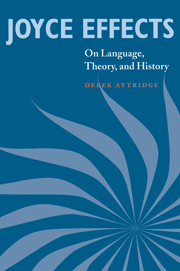Book contents
- Frontmatter
- Contents
- Acknowledgments
- References and abbreviations
- Preface
- Introduction: On being a Joycean
- Chapter 1 Deconstructive criticism of Joyce
- Chapter 2 Popular Joyce?
- Chapter 3 Touching ‘Clay’: reference and reality in Dubliners
- Chapter 4 Joyce and the ideology of character
- Chapter 5 ‘Suck was a queer word’: language, sex, and the remainder in A Portrait of the Artist as a Young Man
- Chapter 6 Joyce, Jameson, and the text of history
- Chapter 7 Wakean history: not yet
- Chapter 8 Molly's flow: the writing of ‘Penelope’ and the question of women's language
- Chapter 9 The postmodernity of Joyce: chance, coincidence, and the reader
- Chapter 10 Countlessness of livestories: narrativity in Finnegans Wake
- Chapter 11 Finnegans awake, or the dream of interpretation
- Chapter 12 The Wake's confounded language
- Chapter 13 Envoi: judging Joyce
- Works cited
- Index
Chapter 8 - Molly's flow: the writing of ‘Penelope’ and the question of women's language
Published online by Cambridge University Press: 22 September 2009
- Frontmatter
- Contents
- Acknowledgments
- References and abbreviations
- Preface
- Introduction: On being a Joycean
- Chapter 1 Deconstructive criticism of Joyce
- Chapter 2 Popular Joyce?
- Chapter 3 Touching ‘Clay’: reference and reality in Dubliners
- Chapter 4 Joyce and the ideology of character
- Chapter 5 ‘Suck was a queer word’: language, sex, and the remainder in A Portrait of the Artist as a Young Man
- Chapter 6 Joyce, Jameson, and the text of history
- Chapter 7 Wakean history: not yet
- Chapter 8 Molly's flow: the writing of ‘Penelope’ and the question of women's language
- Chapter 9 The postmodernity of Joyce: chance, coincidence, and the reader
- Chapter 10 Countlessness of livestories: narrativity in Finnegans Wake
- Chapter 11 Finnegans awake, or the dream of interpretation
- Chapter 12 The Wake's confounded language
- Chapter 13 Envoi: judging Joyce
- Works cited
- Index
Summary
STOPPING THE FLOW
Descriptions of the style of Molly Bloom's interior monologue by critics, female or male, feminist or patriarchal, seem to be fixated on one particular metaphor, a metaphor usually signalled by the word ‘flow’. Whenever the final chapter of Ulysses is being discussed, sooner or later, it appears, that term will crop up. Here are a few instances:
The rarity of capital letters and the run-on sentences in Molly's monologue are of course related to Joyce's theory of her mind (and of the female mind in general) as a flow, in contrast to the series of short jumps made by Bloom, and of somewhat longer ones by Stephen.
(Richard Ellmann, James Joyce, 376)If Bloom and Stephen, in their singularity and in their interchange, seem to represent language's two principles, Molly might represent the extreme of language at its loosest and most flowing.
(Gottfried, The Art of Joyce's Syntax, 35)To enter the mind of Molly Bloom after so much time spent in the minds of Stephen and Leopold is to plunge into a flowing river. If we have hitherto been exploring the waste land, here are the refreshing, life-giving waters that alone can renew it. The flow is theflow of Nature …
(Blamires, The Bloomsday Book, 246)She has her own laws, which are not man's; the rhythms of her meditation despise man's dams and fences … Joyce has dared to think his way into a woman's mind: it would be dangerous to shape, use the artist's cunning: it is safer to leave the floodgates open and let the dark turgid flow have its will; otherwise the spell might be broken. And so we listen to an incredible torrent of reminiscence …
(Burgess, Here Comes Everybody,173–4)- Type
- Chapter
- Information
- Joyce EffectsOn Language, Theory, and History, pp. 93 - 116Publisher: Cambridge University PressPrint publication year: 2000



